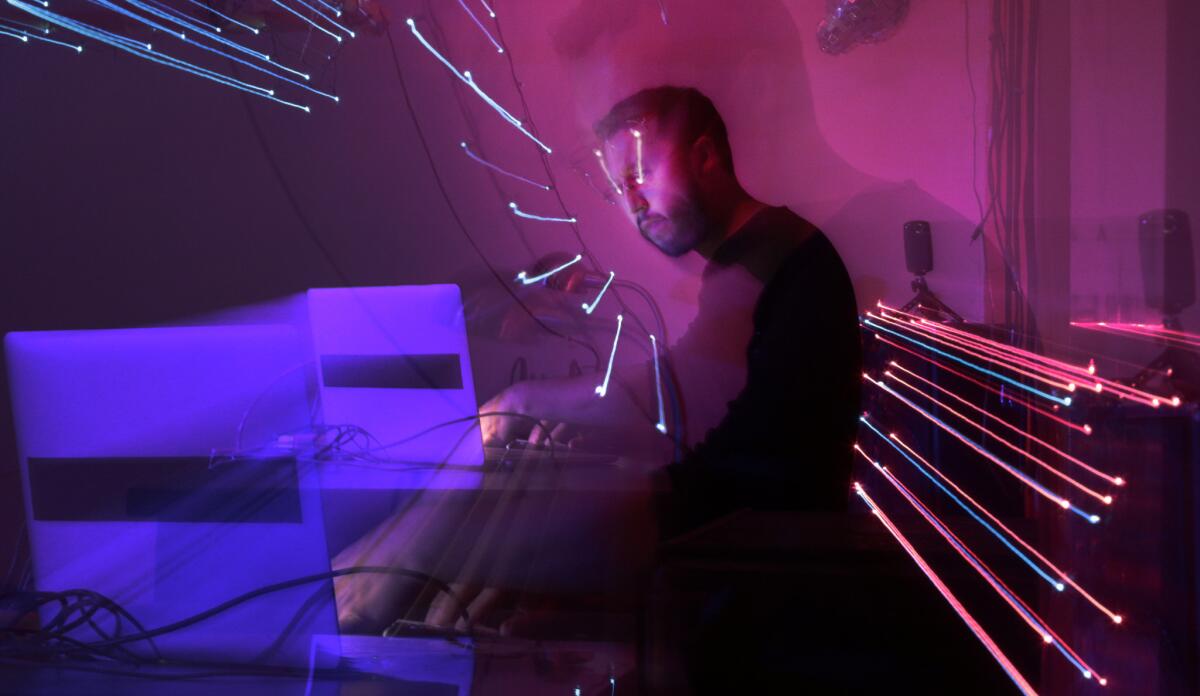Dog Star Orchestra joyfully ventures out of bounds

- Share via
Dog Star Orchestra 10 could easily be mistaken for anything the cat’s dragged in.
The atmosphere at this annual two-week festival — put on by a loose collective of venturesome young instrumentalists and composers, mainly recent CalArts grads — is college-student casual. Beer often comes with the price of admission (and that price is, most of the time, nothing, although donations are welcome). Programs typically begin half an hour late. Everyone seems to know everyone.
Each of the festival’s 15 programs, which continue through June 14, has a different curator. The venues are motley and thus far have included the driveway of a Westside arts patron and the Lower Grand passage to Walt Disney Concert Hall.
I made it to three events this week. On Tuesday night at Curve Line Space, an art gallery in Eagle Rock, the program featured nine pieces by composers from the Icelandic collective known by the acronym SLÁTUR. The next evening featured four L.A. composers and improvisers in a small underground venue in Chinatown, Beta Level, entered from a garbage-strewn alleyway. Thursday night’s flute duo program was held at the wulf, a loft concert space in the downtown arts district that is the home base for the festival and across the street from a strip club called the Play Pen.
All three concerts were funky only in their appearance. Each night brought something new and arresting.
The Icelanders are into updating music based on flamboyant graphic notation, which was at the heart of much American and European avant-garde music in the ‘50s and ‘60s. The SLÀTUR pieces required the musicians, often playing homemade instruments made out of plastic soft-drink containers (Scrapple and Canada Dry were this evening’s Steinway and Fender), kitchen items and whatnot as well as regular and altered instruments.
The players followed the moving lines and spheres and other geometrical shapes in a variety of ways. It was fun to watch. It was more fun not to look at the screen and wonder about the sounds. These ideas aren’t really novel. The German filmmaker Oskar Fischinger meshed music and abstract animation 80 years ago and was an early inspiration for “Fantasia.” But each of the Icelandic composers had a fresh approach, kept it simple, strange and surprising — and short.
“Sounds of a Visceral Nature” was the theme for Beta Level, a resonant space scattered with antique audio equipment, strings of Christmas lights, vines, temple bells, a skull topped with a Santa cap, a couple of disco balls and much else. Here, trombonist Matt Barbier began with solos by Nicholas Deyoe (“Face Splitter”) and Clint McCallum (“Bowel Resection”) of intense, brilliant, virtuosic growling that gave the striking impression that Barbier was dismantling the instrument while playing it.
Deyoe and Ted Byrnes (the evening’s curators) followed with an electric guitar and percussion improvisation that had the remarkable quality of being not interesting, just a couple of guys fooling around on their instruments, then, in an instant, becoming very interesting. It was as if the players were two pieces of a stereo system suddenly joined by Bluetooth.
They made the wild, crazy sounds that avant-garde improvisers have long been making. They had lots of stuff to play with. Deyoe used a smashed Coors can for a capo. Byrnes was all over his drum kit, dashing the skins with, well, whatever the cat dragged in. Once joined, these crazy sounds became not the result of two improvisers riffing off each other but being on exactly the same wavelength at the same time. The room came alive.
And then the room became unnerving. In an electronic music solo operated from a laptop, Scott Cazan explored intoxicating frequency shifts, the aural equivalent of Op art capable of making your head swim. I’m not sure that the kind of mind altering that Cazan is up to is legal — it is best not to drive right away — but it is most pleasurable.
What makes Dog Star particularly valuable is that, while of the moment, the “orchestra” was formed a decade ago to also investigate the tradition of the avant-garde. On Sunday night, the festival will turn to the early works of the late Robert Ashley, written before his groundbreaking operas.
Thursday night at the wulf, flutists Christine Tavolacci and Rachel Beetz played a piece written for them last year by the 83-year-old Alvin Lucier, whose experiments with music and its relationship to brain waves paved the way for composers such as Cazan. Lucier’s “13 Degrees of Darkness” is 13 minutes of long tones, the two flutes going in and out of harmonic sync and, when out of sync, creating striking overtone patterns.
That was followed by Joseph Kudirka’s “Charm,” long tones played for a long time on two bass flutes at low volume. The window was open for air, the refrigerator in the loft turned off for quiet. About three dozen listeners in chairs and on the floor remained in meditative introspection for over a half hour. Street noise drifted in, at times equal in volume to the flutes.
Outside, the Play Pen did its thing. Inside, the wulf did its thing. The mood was never broken.
--------------------
Dogstar Orchestra 10
Where: Various Los Angeles venues, including the wulf, 1026 S. Santa Fe Ave., Los Angeles, and Automata, 504 Chung King Court, Los Angeles
When: Saturday through June 14
Tickets: Free most nights; Sunday, $18
Info: dogstarorchestra.weebly.com
More to Read
The biggest entertainment stories
Get our big stories about Hollywood, film, television, music, arts, culture and more right in your inbox as soon as they publish.
You may occasionally receive promotional content from the Los Angeles Times.











